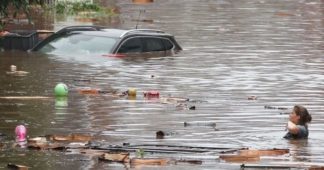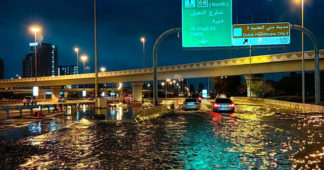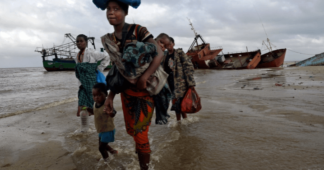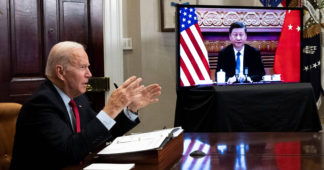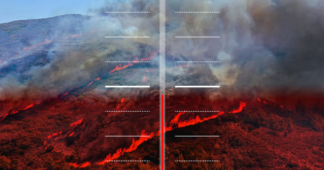“This is not a disaster of Brazil’s making. The whole planet is experiencing increasingly rapid climate changes due largely to the greenhouse gases produced by a handful of wealthy nations,” one expert said.
By Edward Carver
Experts emphasized the escalating risks of climate-related disasters and their disproportionate impacts on low-income people on Monday following flooding in Brazil that has killed at least 150 people and displaced more than 600,000.
The floods that hit over recent days and weeks have knocked out bridges and the main airport in Porto Alegre, a port city in southern Brazil. More than 460 of the 497 municipalities in the southern state of Rio Grande do Sol have been affected, with more than 2 million people impacted, according to provisional government data.
“The situation is catastrophic,” said Rachel Soeiro, Médecins Sans Frontières (MSF) medical coordinator in Brazil, who visited the area by helicopter. “We were able to view the towns from above and noticed that in some cases we couldn’t even see the roofs of houses.”
More than two feet of rain has fallen so far this month, according Brazil’s national weather service, inundating large areas.
“Whole towns and large, urban city centers are in some cases almost completely underwater,” the BBCreported on Saturday.
We joined an emergency services helicopter rescuing people from Brazil’s floods. The rescues themselves are fraught with risks. More than half a million people are displaced.
Watch on @BBCNews at 6 today (on at 1705) or catch up on the News at One.
Whole cities are destroyed? pic.twitter.com/hxZYSVDDmz
— Ione Wells (@ionewells) May 19, 2024
Experts connected the extreme rainfall to climate change, which increases the likelihood of such weather events. Incidents of extreme flooding have increased “sharply” across the planet in the last two decades, according to a study in Nature Water released last year.
“In many ways, this is not a disaster of Brazil’s making. The whole planet is experiencing increasingly rapid climate changes due largely to the greenhouse gases produced by a handful of wealthy nations,” Cristiane Fontes (Krika), executive director of World Resources Institute (WRI) Brasil, wrote in a commentary earlier this month in which she called the situation a “wake-up call for the world.”
In recent weeks, flooding has also hit China, the United Arab Emirates, and Australia, and WRI’s staff in Kenya are dealing with dam breaches from heavy rains, Fontes noted.
A Brazilian expert indicated that the flooding, catastrophic as it has been, should not come as a surprise.
“People on the streets here in Brazil, they’ve attributed this change to global climate change driven by the increase of fossil fuels,” Paulo Artaxo, a physics professor at the University of Sao Paulo, and a member of the Intergovernmental Panel on Climate Change (IPCC), told the Canadian Broadcasting Corporation. He explained that was in line with IPCC projections showing that southern Brazil would face more extreme rainfall due to tropical and polar currents.
In Brazil, as elsewhere, climate impacts are not evenly distributed. MSF relief efforts are focused on the most vulnerable, including Indigenous communities, one of which had been isolated by rising waters and without help for 10 days before being reached by the humanitarian group.
“Assisting those who are most vulnerable is one of our main concerns in such situations,” Soeiro said. “These people were already facing difficult situations before the flooding. But their needs have risen further and access to them has become more difficult.”
Some wealthy people in Porto Alegre have choices such as escaping to a second home, but in “rundown towns” on the city’s periphery, low-income people have no such options, according to CNN.
Brazilian left-wing President Luiz Inácio Lula da Silva has pledged to provide relief money to families that lost their homes. Brazil is one of most unequal countries in the world, according to World Bank data.
We remind our readers that publication of articles on our site does not mean that we agree with what is written. Our policy is to publish anything which we consider of interest, so as to assist our readers in forming their opinions. Sometimes we even publish articles with which we totally disagree, since we believe it is important for our readers to be informed on as wide a spectrum of views as possible.
